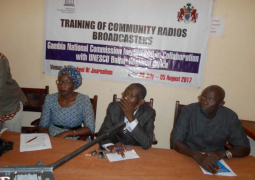
National
Assembly members Wednesday ratified the Miniamata Convention on Mercury.
The
motion was tabled by Pa Ousman Jarju, Ministry of Environment, Climate Change
and Natural Resources and was seconded by Hon. Haddy Nyang Jagne, National
Assembly Member for Jeshwang.
Tabling
the motion before deputies, the Environment minister said the convention was
signed and adopted by The Gambia in October 2013.
The
convention seeks to protect human health and the environment from anthropogenic
emissions and releases of mercury and mercury compounds.
For
this reason, he went on, in 2001, the governing council of UNEP invited the
Executive Director of UNEP to undertake a global assessment of mercury and its
compound.
In
2003, he added, the governing council considered this assessment, and found
that there was sufficient evidence of significant global adverse impacts from
mercury and its compound to warrant further international action to reduce the
risks to human health and the environment, from the release of mercury and its
compounds to the environment.
Minister
Jarju further noted that the Convention was ratified by 32 countries, and The
Gambia becomes the 33rd country to ratify it.
He
said the Miniamata Convention on Mercury would come into full effect if 50
parties ratified the convention.
Mr
Jarju noted that Mercury is a metal characterised by being an odorless liquid
at room temperature and easily volatilised.
“Mercury
is extremely harmful given its persistence; its mobility in the atmosphere; its
ability to form organic compounds and to bio-accumulate in living organism,” he
said.
Mercury
causes damage to health and permanent changes in the nervous system,
particularly impairing the developing nervous system, among many others, he
stated.
He
said addressing the environmental and health hazards associated with mercury
is, therefore, crucial to ensure that hard won development gains are not
compromised.




